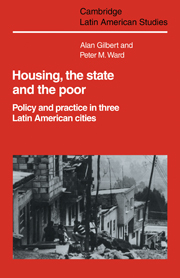Book contents
- Frontmatter
- Contents
- List of figures
- List of tables
- Acknowledgements
- Abbreviations
- 1 Introduction: the research issues and strategy
- 2 Bogotá, Mexico City and Valencia: the social, economic and political backcloth
- 3 Access to land
- 4 Servicing low-income settlements
- 5 Community organization: participation or social control?
- 6 Conclusions
- Appendix 1 The methodology in detail
- Appendix 2 Description of the survey settlements
- Notes
- Bibliography
- Author index
- Subject index
- CAMBRIDGE LATIN AMERICAN STUDIES
5 - Community organization: participation or social control?
Published online by Cambridge University Press: 04 August 2010
- Frontmatter
- Contents
- List of figures
- List of tables
- Acknowledgements
- Abbreviations
- 1 Introduction: the research issues and strategy
- 2 Bogotá, Mexico City and Valencia: the social, economic and political backcloth
- 3 Access to land
- 4 Servicing low-income settlements
- 5 Community organization: participation or social control?
- 6 Conclusions
- Appendix 1 The methodology in detail
- Appendix 2 Description of the survey settlements
- Notes
- Bibliography
- Author index
- Subject index
- CAMBRIDGE LATIN AMERICAN STUDIES
Summary
We now focus our attention at the barrio level and examine the structure of the community organizations that have emerged to defend and develop settlement interests. The need for brevity obliges us to concentrate our analysis around two key issues. First, how much impact does community mobilization have upon the upgrading process? What is the extent of resident participation and how far does participation significantly affect the likelihood of servicing? Second, what governs the response that the state makes to community-development issues? Here our concern is to identify the motives of the state and to account for the way in which it handles community issues. Is the state basically sympathetic, attempting to help the poor as much as it can with limited resources, or is it concerned with maximizing social control by containing demand making to acceptable (and probably low) levels? Our aim is to understand the forms and levels of community participation relating them to the structural characteristics of each city and society.
Few observers doubt the potential value of community participation in development although many question its practice in Latin America. Such a paradox has become increasingly obvious through time. A major gulf exists between reality and the way in which community action and participation should operate. Such a statement is true whatever the political stance of the observer. That right and left might agree about the state of community participation is at first sight surprising.
- Type
- Chapter
- Information
- Housing, the State and the PoorPolicy and Practice in Three Latin American Cities, pp. 174 - 239Publisher: Cambridge University PressPrint publication year: 1985



